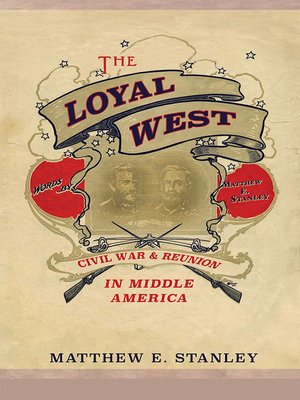
Sign up to save your library
With an OverDrive account, you can save your favorite libraries for at-a-glance information about availability. Find out more about OverDrive accounts.
Find this title in Libby, the library reading app by OverDrive.



Search for a digital library with this title
Title found at these libraries:
| Library Name | Distance |
|---|---|
| Loading... |
Matthew E. Stanley's intimate study explores the Civil War, Reconstruction, and sectional reunion in this bellwether region. Using the lives of area soldiers and officers as a lens, Stanley reveals a place and a strain of collective memory that was anti-rebel, anti-eastern, and anti-black in its attitudes—one that came to be at the forefront of the northern retreat from Reconstruction and toward white reunion. The Lower Middle West's embrace of black exclusion laws, origination of the Copperhead movement, backlash against liberalizing war measures, and rejection of Reconstruction were all pivotal to broader American politics. And the region's legacies of white supremacy—from racialized labor violence to sundown towns to lynching—found malignant expression nationwide, intersecting with how Loyal Westerners remembered the war.
A daring challenge to traditional narratives of section and commemoration, The Loyal West taps into a powerful and fascinating wellspring of Civil War identity and memory.
| Cover Title page Contents Foreword Acknowledgments Introduction: "The Geography Embodied": Loyal Westerners in War and Peace 1. "The Progeny of Jamestown": Racial Construction and Western Identity on the Dixie Frontier 2. "The Boundary between Contending Nations": Border War and Restraints on Western Unity 3. "The War Fattens on the Blood of Western Men": The Limits of Practical Abolitionism on Slavery's Western Border 4. "The Great Brotherhood of the West": The Demise of the Antebellum West and the Construction of the Loyal West 5. "Was It for This You Fought?": Retreat from Reconstruction the New White Supremacy in the Loyal West 6. "Never Checked—Always Victorious": The Heyday of the Loyal West 7. "Solely to Suppress the Rebellion": Commemorating Conservative Unionism in the Loyal West Epilogue. "No More Shall the Winding Rivers Be Red": Reconciliation and the Passing of the Loyal West Appendix Notes Bibliography Index | "The Civil War transformed the Southern Midwest's cultural and political affinity with the border South into a strong Unionist (but not emancipationist) loyalty that helped the North win the war. As Matthew Stanley makes clear in this intriguing study, however, the Ohio Valley region led the Northern retreat from Reconstruction and the reconciliationist movement of the 1890s that partially restored that antebellum cultural affinity and pushed the historical issues of slavery and abolition into the background."—James M. McPherson"Stanley expertly demonstrates how emancipation and the postwar struggles over the precise meanings of freedom and equality ultimately made white political culture in 'middle America' as anti-Reconstruction and pro-segregation as one might have found in the South."—The Annals of Iowa
"Stanley's study serves as a welcome addition to the growing field of borderland studies and the Civil War."—Journal of Southern History
|Matthew E. Stanley is an assistant professor of history at Albany State University.







